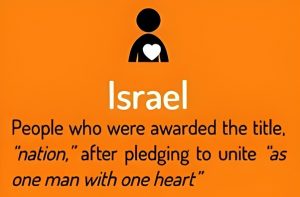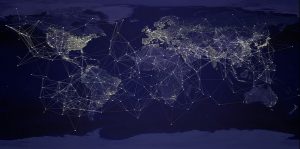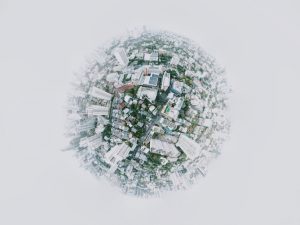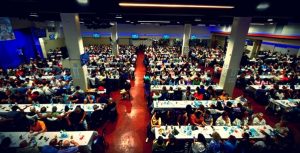“Rising Global Antisemitism: A Dark Reality Despite Mainstream Support for Israel” (Quora)
 Michael Laitman, On Quora: “Rising Global Antisemitism: A Dark Reality Despite Mainstream Support for Israel“
Michael Laitman, On Quora: “Rising Global Antisemitism: A Dark Reality Despite Mainstream Support for Israel“
Despite mainstream global support for Israel following the tragic events of October 7, there has also been inescapable looming antisemitic sentiment, crimes and threats around the world. These include:
Spikes in antisemitic rhetoric in social media, including celebrating the October 7 attack on Israel’s civilians, calls for further aggression against Israel and its supporters, and a surge of antisemitic conspiracy theories starting from the same day as the attack. (Source: ADL)
Four times more antisemitic incidents in the UK since the attack than in the same period the previous year. (Source: BBC)
A variety of antisemitic expressions from naming Jews in the diaspora as dirty/filthy Jews, accusing diaspora Jews of dual loyalty, blaming Jews for killing Jesus and for purposefully targeting Palestinian children in Israel’s attacks, waving Nazi flags, a crowd shouting “Gas the Jews” at a pro-Palestinian protest in Sydney, a break-and-enter at a kosher restaurant in London with “Free Palestine” spray-painted on the cash register, and vans painted with “Holocaust never happened” and “Hitler was right” in Florida. Jewish students at US campuses reported verbal assaults, and three Salt Lake City synagogues were forced to evacuate due to a bomb threat during pro-Palestinian rallies following the war’s outbreak. (Source: AJC)
The Day of Rage declared by Hamas’ former leader on Friday, 13 October involved more than twenty countries holding pro-Palestinian protests, and made emotions run high. In New York City alone, some people, like Marc Schiller, who attended a synagogue in Manhattan’s Upper West Side on Friday, sought solace and strength in his Jewish identity, drawing inspiration from feeling a need to stand in solidarity with Israel. Others, however, became extra cautious. For instance, some Israeli musicians opted to cancel their participation in a Friday service in Manhattan, citing concerns about being part of large Jewish gatherings. Also, beyond the Jewish community, many people in general chose to stay home in order to avoid public areas. The responses within the Jewish community, however, show stark contrasts that highlight the complex interplay of pride, fear, anger, trauma and solidarity within the Jewish diaspora at a time when Israelis themselves also deal with a swell of emotions as they deal with the aftermath of the tragic events on October 7 and head into war.
Many wonder why Jews in the diaspora often face animosity for situations taking place in Israel, especially when many Jews around the world do not identify with or support Israel. The answer is that a lot of people have a problem with Jews, period. This can lead to hostility not just against Israel but also against Jewish people as a whole.
If there had been any doubt that Hamas was solely against the existence of the State of Israel prior to October 7, the terror attacks of that day clearly and painfully displayed the organization’s genocidal antisemitic intent. Even US President Joe Biden made well known to the public in his remarks following the attack that Hamas is “a group whose stated purpose for being is to kill Jews.” But it is not just Hamas that has tried to shadow its Jew-hating sentiment under an anti-Israel and anti-Zionist disguise.
Kabbalist Yehuda Ashlag (Baal HaSulam) stated that Jews are “hated by all the nations, whether for religious, racial, capitalist, communist or for cosmopolitan reasons, etc. It is so because the hatred precedes all reasons, but each merely resolves its loathing according to its own psychology.” That is, hatred of Jews is deeply rooted in the fabric of human nature, and it transcends individual psychological explanations and sociological analyses.
In today’s globally interconnected and interdependent world, where the pains or the joys in one place can spread to the other side of the world in an instant, in order to maintain equilibrium and stability, Jews from all backgrounds must foster unity above their differences. The Jews’ unifying influence would then radiate positively through today’s complex web of globally-established connections.
In his article, “The Arvut [Mutual Guarantee],” Baal HaSulam expressed that the Jewish people were “constructed as a sort of gateway by which the sparks of purity would shine upon the entire human race the world over… until they develop to such an extent that they acknowledge the pleasantness and tranquility that are found in the kernel of love of others.”
When this unifying influence is absent, the world falls prey to the grip of human egoism, fueling hatred and division. And the more people feel problems and crises entering their lives, the more they feel instinctively that Jews are to blame.
While many in the world today identify antisemitism as a growing problem, the effort to combat the phenomenon, whether through education, diplomacy, advocacy, awareness campaigns or dialogues, only address the surface symptoms and fail to approach the issue at its core.
Education is indeed necessary, but it should aim at raising awareness of the natural system we all live in and share. This system develops its every level—and most significantly humanity—to higher levels of unification. It was this ability to unite above divisions that established the Jewish people in their very beginnings (the Hebrew word for “Jew” [Yehudi] comes from the word for “united” [yihudi] [Yaarot Devash, Part 2, Drush no. 2]).
If the Jewish people activate a unifying spirit among one another, they act as a conduit for such unity to spread worldwide. When people feel the positive effects of a unifying spirit entering their lives, the negative antisemitic sentiment will invert to a positive feeling that Jews serve to bring harmony and peace to the world. It is as Rav Abraham Kook once wrote, “In Israel lies the secret for the unity of the world.”
[319197]

Written/edited by students of Kabbalist Dr. Michael Laitman.
Image: “2023.10.08 Pro-Terrorism Rally, Washington, DC USA 281 20109” by Ted Eytan.















